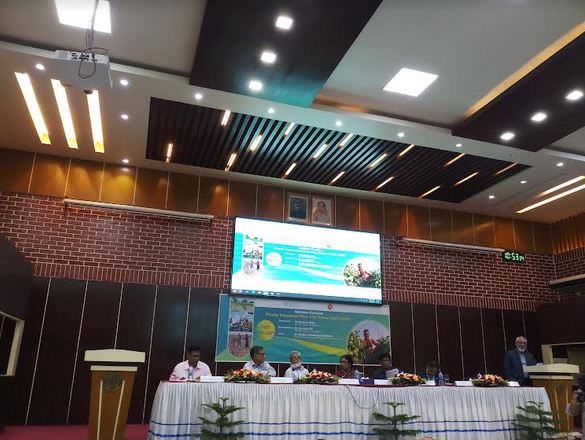
DHAKA, June 26, 2024 (BSS) - Experts at a workshop today laid emphasis on
developing the crop sector investment plan to face climate change challenges
as Bangladesh is one of the most vulnerable countries affected by global
warming.
They said extreme weather events like heatwave, flooding and salinity
intrusion have been affecting crop production in Bangladesh and that is why
climate risks should be considered in preparing investment plan in the crop
sector.
The Food and Agriculture Organization of the United Nations(FAO),in
collaboration with Ministry of Agriculture, organised the validation workshop
on the Priority Investment Plan-Crop Sector (PIP-CS:2024-2030) at BARC
conference room in Farmgate here.
Agriculture Secretary Wahida Akter, FAO Representative in Bangladesh Jiaoqun
Shi, former Vice Chancellor of Sher-e-Bangla Agricultural University Prof Dr
Md Shahidur Rashid Bhuiyan, former Secretary and Chairman of Bangladesh
Krishi Bank Md Nasiruzzaman, Additional Secretary of the agriculture ministry
Dr Maloy Chowdhury and Director General of Bangladesh Rice Research Institute
(BRRI) Dr Md Shahjahan Kabir, among others, spoke at the workshop with
Executive Chairman of Bangladesh Agricultural Research Council (BARC) Dr
Shaikh Mohammad Bokhtiar in the chair.
FAO's PIP technical team lead Bhaskar Goswami made a thematic presentation on
the key areas of the Priority Investment Plan-Crop Sector (PIP-CS).
Speaking as the chief guest, Wahida Akter said: "We have been working
together with FAO towards transforming the crop sector in Bangladesh to
achieve the national development goals in implementation of the National
Agricultural Policy."
Stressing the need for minimising crop loss, she said if the crop loss is
reduced, the country's food security will be enhanced.
Citing the data of Bangladesh Meteorological Department, Nasiruzzaman said
the country's temperature has increased 1.5 degree Celsius on average in the
last 50 years.
Mentioning that heatwave is significantly affecting the country's
agriculture, he said crop production has declined by 20-30 percent in north-
western region of Bangladesh due to temperature rise, pointing out that a
vast area of arable land remained fallow there due to scarcity of water.
Jiaoqun Shi, FAO Representative in Bangladesh, said: "FAO is happy to support
the preparation of Priority Investment Plan for the crop sector, providing
technical assistance under FAO's flagship Hand-in-Hand Initiative."
The workshop brought together multiple stakeholders including private sector,
development partners, government, researcher, academia and civil society
organisations, while key areas for potential investment in the crop sector
were presented.
FAO is providing technical support to the government of Bangladesh in
developing the Priority Investment Plan in the Crop Sector (PIP-CS) to
identify potential investment areas and providing a platform under its Hand-
in-Hand Initiative to bring together stakeholders to mobilise funding for an
economically diversified and sustainable agriculture.
The PIP-CS was drafted in collaboration with a technical team set up by the
Ministry of Agriculture comprising experts from relevant ministries,
agencies, academia, and the private sector.
In preparation of this validation workshop, about 700 local stakeholders from
the private sector, civil society, researcher, non-state actor and academia
participated in regional consultations conducted by the Ministry of
Agriculture in collaboration with FAO in Dhaka, Rajshahi, Barisal, Cumilla,
Jashore, and Mymensingh in July and September 2022.
These consultations identified four priority investment areas: agro-
processing, value addition and marketing; specialised, multipurpose cold
storage, post-harvest management, supply chain management; irrigation and
water management; and climate smart agriculture.
By prioritising these actions, the government of Bangladesh aims towards
enhancing farmers' income, protecting consumer's health and the environment,
enhancing growth in its agricultural sector and thereby contributes towards
meeting the Sustainable Development Goals (SDGs) by 2030.